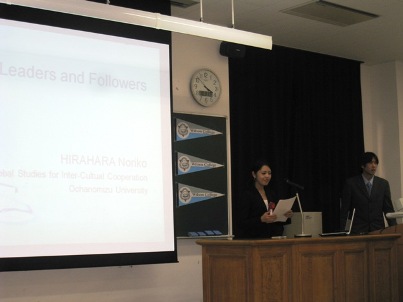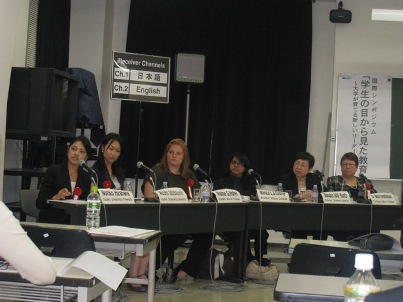- トップページ
- 文教育学部
- グローバル文化学環
- グロ文生のVOICE・SHOT
- 国際シンポジウム"Leaders and Followers"報告
ページの本文です。
国際シンポジウム"Leaders and Followers"報告
2016年9月16日更新
"Leaders and Followers"(4年 平原紀子)
2009年10月掲載
The International Symposium: Education Viewed Through the Eyes of Students―University Fostering New Leadership, on October 31, 2009 at Ochanomizu University "Leaders and Followers"
Wilson College President Edmundson and Dean Hendrickson, Ochanomizu University President Hanyu and members of the Ochanomizu University, it is a great honor to speak with you today. I'm Noriko Hirahara, Ochanomizu University class of 2010. I'm majoring in Global Studies, focusing primarily on East Asia. Last year, I studied at Vassar College in New York for an entire school year. At times, the workload would quickly pile up, but Vassar's beautiful campus and great people surely made it easier to deal with. My time at Vassar was quite possibly one of the most amazing experiences of my life.
 But I'm not here to talk about Vassar. Today, I'm going to talk about the relationship between leaders and followers. First of all, what do you think makes a good leader? Smarts? Riches? Innate qualities?…One could list a variety of possibilities, but no one factor is enough to make a leader. No matter how smart, rich, or naturally talented a person is, his or her positive attributes alone do not always make a good leader. One needs something else in addition to what he or she already has. From my experience, a good leader's ability usually depends on his or her followers. In other words, it is good followers that make good leaders.
But I'm not here to talk about Vassar. Today, I'm going to talk about the relationship between leaders and followers. First of all, what do you think makes a good leader? Smarts? Riches? Innate qualities?…One could list a variety of possibilities, but no one factor is enough to make a leader. No matter how smart, rich, or naturally talented a person is, his or her positive attributes alone do not always make a good leader. One needs something else in addition to what he or she already has. From my experience, a good leader's ability usually depends on his or her followers. In other words, it is good followers that make good leaders.
I began to notice this during my stay at an American college dormitory. Vassar has nine dorms, each of which has a "house team" consisting of a president and about ten "student fellows". Together, they plan weekly dorm and annual school events, help freshmen adjust to college life, resolve dorm problems, and generally act as peer mediators. Their jobs seemed difficult because not only did they have these responsibilities, they also had to stay on top of their schoolwork. However, people at Vassar do not seem to mind the burden of additional responsibility, but rather, voluntarily run for house team elections each year, trying to do their best to ensure that residents enjoy dorm life.
At Ochadai dormitories, however, the aforementioned type of leadership does not seem to exist. Although I have never lived in a Japanese dorm, I've heard that people do not usually run for dorm leadership positions. When there are no volunteers, leaders are typically decided by drawing straws, with the person who draws the shortest straw becoming a leader. Last year, a friend of mine actually drew "the short straw". She said that the position was so troublesome that she would never be a leader again. However, Ochadai dorm leaders' tasks are quite similar to those of their counterparts at Vassar, and usually involve completing paperwork, listening to residents' complaints, and holding meetings to solve any disputes or problems. Although these responsibilities are very similar to those of Vassar house teams, Japanese dorm residents seem to think this job is too troublesome to manage.
 Why are there such big differences in people's perception of a very similar leadership position? I doubt the leaders themselves are at fault, since both at Vassar and Ochadai, leaders typically possess a variety of leadership skills have some prior leadership experience. The problem, I believe, lies with the followers. Leaders in Japan are often supposed to solve all the problems by themselves, relying on very little help or cooperation from their followers. As I mentioned earlier, many people attending elite educational institutions have some kind of leadership experience. Sometimes, they have their own ways of doing things, which can make the task at hand more complicated. While including other group members' opinions, leaders must be the ones who ultimately decide how to carry out tasks. Oftentimes, however, leaders may not know how to handle arrogant group members who try to change a project's direction. For instance, when I was a member of a high school orchestra club, the head of the club would handle administrative matters such as attending school meetings or making announcements for upcoming concerts. As the head of the club was so busy dealing with external matters, others would assume leadership roles within the orchestra. Though they might have had some leadership skills, in an attempt to avoid trouble, they refrained from holding open discussions with the entire orchestra, inadvertently causing additional problems.
Why are there such big differences in people's perception of a very similar leadership position? I doubt the leaders themselves are at fault, since both at Vassar and Ochadai, leaders typically possess a variety of leadership skills have some prior leadership experience. The problem, I believe, lies with the followers. Leaders in Japan are often supposed to solve all the problems by themselves, relying on very little help or cooperation from their followers. As I mentioned earlier, many people attending elite educational institutions have some kind of leadership experience. Sometimes, they have their own ways of doing things, which can make the task at hand more complicated. While including other group members' opinions, leaders must be the ones who ultimately decide how to carry out tasks. Oftentimes, however, leaders may not know how to handle arrogant group members who try to change a project's direction. For instance, when I was a member of a high school orchestra club, the head of the club would handle administrative matters such as attending school meetings or making announcements for upcoming concerts. As the head of the club was so busy dealing with external matters, others would assume leadership roles within the orchestra. Though they might have had some leadership skills, in an attempt to avoid trouble, they refrained from holding open discussions with the entire orchestra, inadvertently causing additional problems.
On the other hand, student fellows at Vassar seemed to work as hard as the house president did. I lived in a girls' dorm called Strong. At Strong, not only the house president, but also the student fellows were reliable people. It seemed like anyone on the house team could be a leader. Furthermore, they would try to find a point of compromise by taking turns discussing the issues and potential solutions. I think this synergy between leaders and followers is crucial in achieving effective leadership.
The same can be said for educational systems. In many of the classes I took at Vassar, I felt that my peers had had good listening skills, and therefore were better prepared for discussion than many students in Japan. One day, I asked some friends what people who were previously not good at speaking in front of people did to improve their public speaking skills. They told me that those people were trained in their youth to be able to express their opinions in front of people. It seems that this pedagogical method is rather popular in European countries as well.
In Japan, however, since more emphasis is put on exam grades, students can get a good grade in a course without ever speaking during class. Some believe that this pedagogical system must change because it fails to educate students to express themselves on the world stage. It is often said Japanese people wait too long to say their opinions, and consequently miss their chance to speak. While I agree to the extent that the current Japanese teaching style should be modified to a more Western approach to promote the education of more proactive students, the current method of simply telling students to "speak out" or "stop being shy" obviously does not work. While some Westerners may be stereotypically proactive, many others are not. They are, however, kind and patient enough to listen to others.
In my first semester at Vassar, I had great difficulty participating in class. Since class discussions were held at a breakneck speed, I was not sure how to respond when others would counter my opinions. Anxiety and nervousness over potential English mistakes would also keep me from voicing my opinions. In Japan, I always tried to compile proposed ideas from my group, summarize them, and present them as a group representative. When group members could not clearly express themselves, I would often attempt to help them convey their ideas. However, in order to save time, I would end up asking them if the group summary was sufficient. Similarly, some students at Vassar would ignore my opinion if I could not articulate my statements properly. Others, however, would try to discuss my opinions with me and help me to clarify my statements. Thanks to them, I gradually got used to speaking in class. Those students not only had good speaking skills, they also had good listening skills. The combination of good speaking and listening skills is essential to leading good discussions.
There is an ironic misunderstanding in the common stereotype of Japanese and American communication. The Japanese are thought to value "balance", and attempt to keep good relationships with people. For this reason, they are said to have good teamwork. Americans, on the other hand, are often thought to express their opinions so aggressively that it appears as if they do not care about the opinions of others. In reality, I believe it is the Japanese who do not listen to other people's opinions. They do not argue their viewpoints, but simply relinquish their say in any matters, because it is easier and more peaceful. They think that they are keeping good balance, but they are simply surrendering their opinions and fail to come to an agreement. At first glance, Americans may appear to be aggressive during discussions. However, they actually listen as much as they speak to one another. I believe this form of discussion is more balanced and therefore productive, because a compromise for Americans is decided after thorough debate. Of course, American leaders are not always successful; but having good listeners and followers leads good discussions, and consequently makes a good leader.
So, what should schools do to educate good leaders? Nowadays, many Japanese schools try to have American-style classroom discussions. However, these schools should begin by training listening skills before having discussions. One should be trained to prevent information from flowing in one ear and out the other, and to instead understand and properly critique others' opinions. By properly training one's listening skills, the proper atmosphere for quality discourse will be in place, as there will be good listeners, or followers. Schools should then, after preparing students to be good listeners, introduce discussion in class. Without proper discussion, students cannot learn to articulate themselves intelligently. But without good listeners, even the most articulate speakers cannot be good leaders. If one is a good listener and also has good listeners, he or she can be both a follower and a leader. This is why I believe that educating good followers ultimately translates to educating effective leaders.










